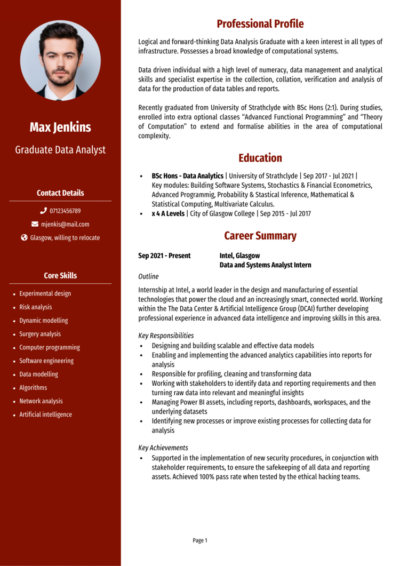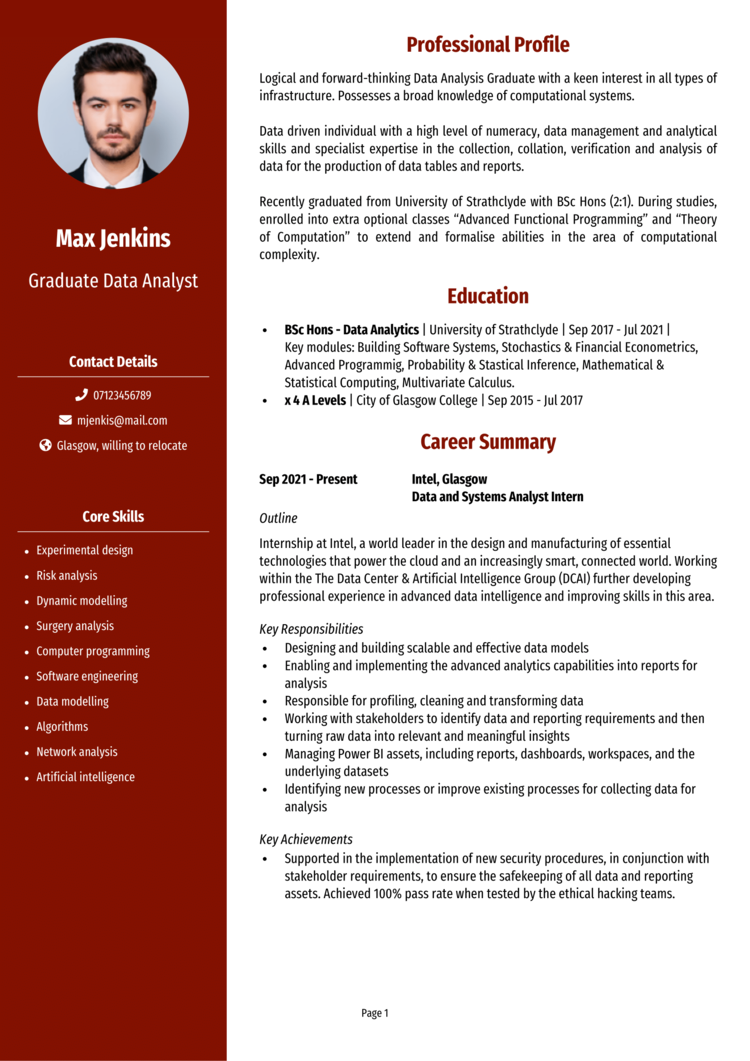As a recent graduate, your CV is going to be the key to getting noticed and securing a data analyst role.
If you’ve never had to write a CV before or yours is a little outdated, this step-by-step guide is for you.
Find out how to highlight your new qualifications using our top tips and graduate data analyst CV example below.
|
Graduate Data Analyst CV example
This CV example illustrates the ideal structure and format for your Graduate Data Analyst CV, making it easy for busy hiring managers to quickly identify your suitability for the jobs you’re applying for,
It also gives some guidance on the skills, experience and qualifications you should emphasise in your own CV.


Graduate Data Analyst CV layout and format
Your CV is the first impression you’ll make on anybody who reads it.
A disorganised, cluttered and barely-readable CV could seriously decrease your chances of landing interviews, so it’s essential to make sure yours is slick, professional and easy to navigate.
You can do this by using a clear structure and formatting your content with some savvy formatting techniques – check them out below:
Tips for formatting your Graduate Data Analyst CV
- Length: If you want to hold the reader’s attention and ensure your CV isn’t yawn-worthy, it’s best to stick to two sides of A4 or less. This is more than enough room to highlight why you’re a good match for the role – anything more can quickly become tedious!
- Readability: To help recruiters quickly skim through your CV, it’s important to format your section headings with bold or a different colour font and break up lengthy paragraphs into short sharp bullet points. This enables them to easily identify important information and assess your suitability.
- Design: When it comes to CV design, it’s best to keep things simple and sleek. While elaborate designs certainly command attention, it’s not always for the right reasons! Readability is key, so whatever you choose to do, make sure you prioritise readability above everything.
- Photos: Don’t add profile photos to your CV unless you work in an industry or region which prefers to see them. Most employers in the UK will not need to see one.
Quick tip: Creating a professional CV style can be difficult and time-consuming when using Microsoft Word or Google Docs. To create a winning CV quickly, try our quick-and-easy CV Builder and use one of their eye-catching professional CV templates.
CV structure
For easy reading, write your CV to the following CV structure:
- Contact details – Make it easy for recruiters to get in touch with you by listing your contact details at the top of your CV.
- Profile – A short and snappy summary of your experience and skills, showcasing what makes you a good fit for the position.
- Work experience / career history – Note down all your work history, with your current position first, then working backwards.
- Education – A short list of your academic background and professional/vocational qualifications.
- Interest and hobbies – This is an optional section, which you can use to highlight any relevant hobbies or interests.
Now you understand the basic layout of a CV, here’s what you should include in each section of yours.
Contact Details
Tuck your contact details into the corner of your CV, so that they don’t take up too much space.
Stick to the basic details, such as:
- Mobile number
- Email address – It should sound professional, such as your full name.
- Location -Just write your rough location, rather than your full address.
- LinkedIn profile or portfolio URL – If you include these, ensure they’re sleek, professional and up-to-date.
Graduate Data Analyst CV Profile
Make a strong first impression with recruiters by starting your CV with an impactful profile (or personal statement for junior applicants).
This short introduction paragraph should summarise your skills, experience, and knowledge, highlighting your suitability for the job.
It should be compelling enough to encourage recruiters to read through the rest of your CV.
CV profile writing tips:
- Make it short and sharp: When it comes to CV profile length, less is more, as recruiters are often time-strapped. Aim for around of 3-5 persuasive lines.
- Tailor it: Before writing your CV, make sure to do some research. Figure out exactly what your desired employers are looking for and make sure that you are making those requirements prominent in your CV profile, and throughout.
- Don’t add an objective: Career goals and objectives are best suited to your cover letter, so don’t waste space with them in your CV profile.
- Avoid generic phrases: Clichés like “blue-sky thinker with a go-getter attitude” might sound impressive to you, but they don’t actually tell the recruiter much about you. Concentrate on highlighting hard facts and skills, as recruiters are more likely to take these on board.
Example CV profile for Graduate Data Analyst
What to include in your Graduate Data Analyst CV profile?
- Experience overview: Start with a brief summary of your relevant experience so far. How many years experience do you have? What type of companies have you worked for? What industries/sectors have you worked in? What are your specialisms?
- Targeted skills: Ensure that your profile highlights your key skills that are most relevant to your Graduate Data Analyst, and tailor them to match the specific job you are applying for. To do this, refer to the job description to closely align your skills with their requirements.
- Key qualifications: Be sure to outline your relevant Graduate Data Analyst qualifications, so that anyone reading the CV can instantly see you are qualified for the jobs you are applying to.
Quick tip: If you are finding it difficult to write an attention-grabbing CV profile, choose from hundreds of pre-written profiles across all industries, and add one to your CV with one click in our quick-and-easy CV Builder. All profiles are written by recruitment experts and easily tailored to suit your unique skillset.
Core skills section
Create a core skills section underneath your profile to spotlight your most in-demand skills and grab the attention of readers.
This section should feature 2-3 columns of bullet points that emphasise your applicable skills for your target jobs. Before constructing this section, review the job description and compile a list of any specific skills, specialisms, or knowledge required.
Important skills for your Graduate Data Analyst CV
Data analysis – Collecting, organising, and analysing complex data sets using statistical methods and data visualisation tools.
Programming – Utilising knowledge of programming languages such as Python, R, and SQL to process and manipulate data.
Problem resolution – Identifying and troubleshooting issues in data sets and developing solutions to improve data quality and accuracy.
Stakeholder communication – Explaining complex data analysis concepts in simple and understandable language to both technical and non-technical stakeholders.
Data management – Utilising knowledge of data warehousing, data integration, and data migration to ensure data accuracy and accessibility.
Machine learning – Utilising knowledge of machine learning algorithms and techniques to build predictive models and identify trends in data.
Excel proficiency – Utilising Microsoft Excel to manipulate and analyse large data sets and create charts and graphs for presentations.
Statistical analysis – Utilising knowledge statistical software such as SPSS, SAS, and STATA to perform statistical analysis and create regression models.
Data visualisation – Utilising knowledge of data visualisation tools such as Tableau, Power BI, and QlikView to create compelling and informative visualizations of data.
Project management – Managing projects, prioritising tasks, and meeting deadlines while ensuring high quality and accuracy of work.
Quick tip: Our quick-and-easy CV Builder has thousands of in-demand skills for all industries and professions, that can be added to your CV in seconds – This will save you time and ensure you get noticed by recruiters.


Work experience section
Now that recruiters have a good overview of your skills and abilities, you need to jump into the detail of your career history.
Give them a more thorough insight into what you can do by creating a detailed list of your relevant experience.
Start with your current role, and work backwards through all the relevant positions you’ve held.
This could be freelance, contract or voluntary work too; as long as it’s related to the role you’re applying for.
Structuring each job
Lengthy, unbroken chunks of text is a recruiters worst nightmare, but your work experience section can easily end up looking like that if you are not careful.
To avoid this, use my tried-and-tested 3-step structure, as illustrated below:
Outline
Begin with a summary of your role, detailing what the purpose of your job was, who you reported to and what size of team you were part of (or led).
Key responsibilities
Follow with a snappy list of bullet points, detailing your daily duties and responsibilities.
Tailor it to the role you’re applying for by mentioning how you put the target employer’s desired hard skills and knowledge to use in this role.
Key achievements
Finish off by showcasing 1-3 key achievements made within the role.
This could be anything that had a positive effect on your company, clients or customers, such as saving time or money, receiving exemplary feedback or receiving an award.
Sample job description for Graduate Data Analyst CV
Outline
Internship at Intel, a world leader in the design and manufacturing of essential technologies that power the cloud and an increasingly smart, connected world. Working within the The Data Center & Artificial Intelligence Group (DCAI) further developing professional experience in advanced data intelligence and improving skills in this area.
Key Responsibilities
- Designing and building scalable and effective data models
- Enabling and implementing the advanced analytics capabilities into reports for analysis
- Responsible for profiling, cleaning and transforming data
- Working with stakeholders to identify data and reporting requirements and then turning raw data into relevant and meaningful insights
Quick tip: Create impressive job descriptions easily in our quick-and-easy CV Builder by adding pre-written job phrases for every industry and career stage.
Education and qualifications
In your education section, make any degrees, qualifications or training which are relevant to Graduate Data Analyst roles a focal point.
As well as mentioning the name of the organisation, qualification titles and dates of study, you should showcase any particularly relevant modules, assignments or projects.
Hobbies and interests
The hobbies and interests CV section isn’t mandatory, so don’t worry if you’re out of room by this point.
However, if you have an interesting hobby, or an interest that could make you seem more suitable for the role, then certainly think about adding.
Be careful what you include though… Only consider hobbies that exhibit skills that are required for roles as a Graduate Data Analyst, or transferable workplace skills.
There is never any need to tell employers that you like to watch TV and eat out.


A strong, compelling CV is essential to get noticed and land interviews with the best employers.
To ensure your CV stands out from the competition, make sure to tailor it to your target role and pack it with sector-specific skills and results.
Remember to triple-check for spelling and grammar errors before hitting send.
Good luck with the job search!










